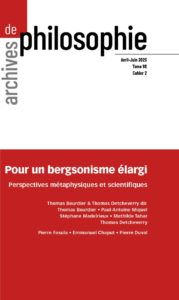 For an expanded Bergsonism
For an expanded Bergsonism
Metaphysical and scientific perspectives
Tome 88, issue 2, April-June 2025
Thomas Bourdier & Thomas Detcheverry, Foreword
Thomas Bourdier, Bergson and the question of realism. Metaphysical inference and critical empiricism
In this paper, I propose to reconstitute the argumentative devices employed by Bergson to provide a base for his metaphysical realism. In particular, I question the possible tension between this realism and the purely empiricist method claimed by Bergson. I then proceed to suggest the existence of an connection between two complementary strategies in his work. On the one hand, a strategy of “inference to the best explanation” that adopts realism as a probable hypothesis given a number of experiential facts; on the other, a strategy based on an empiricist genealogy of the concept of “reality,” which leads to the problem’s dissolution in effecting a differentiation between sense and nonsense.
Paul-Antoine Miquel, Becoming and spirituality in Bergson’s metaphysics
In the opening of Creative Evolution, Bergson develops an analogy between human consciousness and the universe’s spiritual life. This article argues that such an analogy is only possible under two conditions. First, the philosopher must draw on science to move beyond the confines of consciousness. Consequently, a strict separation between metaphysical and scientific experience is no longer tenable. Second, the mind is defined by the difference between its being and its acting. As such, « it draws from itself more than it has. » This is why it is always both spirituality and materiality, according to a non-standard logic of internal polarization.
Stéphane Madelrieux, Beyond right- and left-wing Bergsonism: Bergmatism
This article presents three ways of inheriting Bergson’s thought, arguing in favor of adopting the third, which is called “Bergmatism,” a cross between Bergsonism and pragmatism. It begins by pointing out the differences between the first two approaches, “right-wing Bergsonism” and “left-wing Bergsonism,” whose common presuppositions are then examined in order to introduce Bergmatism as an alternative. As Bergmatism is as much a philosophical program as a way of reading Bergson, it is presented here in narrative rather than analytical form, by imagining what Bergson’s work would have looked like had he been a Bergmatist.
Mathilde Tahar, Élan vital and the consciousness of the living:
Exploring non-human creativity through Bergsonian philosophy
To understand evolution, Bergson developed the concept of élan vital, which he compared to the progression of a conscience. This comparison has led commentators to interpret his philosophy as spiritualist, contributing to its discredit. Yet, the reference to consciousness is chiefly heuristic: It serves as a model for grasping the creativity of biological duration, of which human consciousness is but one instance. In this paper, I explore other particularizations of élan vital—non-human forms of consciousness—and show that Bergson’s philosophy, far from being confined to an outdated spiritualism, provides fertile theoretical avenues for contemporary biology.
Thomas Detcheverry, Deleuze, a Bergsonian reader of Spinoza and Leibniz: Duration and freedom
The aim of this article is to show how, by reconciling Bergson with Spinoza and Leibniz, Deleuze intends to free Bergsonian ethics from its spiritualist dualism, while retaining its foundation in a metaphysics of becoming. Not only does Deleuze’s reception of Bergson establish an original interpretation of the relationship between Bergsonism and classical philosophy, different from that proposed by Bergson himself, but this historical rereading also paves the way for the contemporary invention of an alternative neo-Bergsonian ethic.
* * *
Pierre Fasula, A normative animal: Norm and form of life from a Wittgensteinian perspective
Why obey a norm? What does normativity consist of? What is the origin of normativity? The Wittgensteinian notion of the « normative animal » helps dispel the confusion surrounding these questions, particularly by criticizing the idea of the emergence of norms, as developed by Maurizio Ferraris, among others. A normative status is conferred on an act or a practice, and reality provides us with reasons to follow or not follow this norm. Furthermore, it allows for a critique of the explanation of the existence of norms through our form of life, as Christine Korsgaard argues: The aim is, in fact, to relocate norms within our forms of life, to make them a feature of our form of life.
Emmanuel Chaput, Critique of the metaphysics of the subject in Karl Löwith and Martin Buber. “Zurück zu Feuerbach!”
In the 1920s, a renewed interest in the I-Thou relationship took place simultaneously and independently among authors coming from different philosophical traditions, from phenomenology (Karl Löwith) to the philosophy of dialogue (Martin Buber). This renewal implies a revival of Ludwig Feuerbach’s thought. This paper discusses the meaning of this revival in the context of a crisis of the metaphysics of the subject that calls for its overcoming.
Pierre Duval, Chomsky-Foucault: An altered debate. A displayed then concealed performative self-contradiction
This article analyzes the editorial controversy surrounding the 1971 debate between Noam Chomsky and Michel Foucault on “human nature.” We will point at major discrepancies between the video footage and the published versions of the discussion, which were not highlighted to the public nor to Chomsky himself, dealing in some cases with full-scale rewritings of some of Foucault’s remarks, leading frequently to evident misunderstandings. This paper, through the identification of key parts of these reworkings, offers an editorial analysis never put forward before in publications on the debate.

